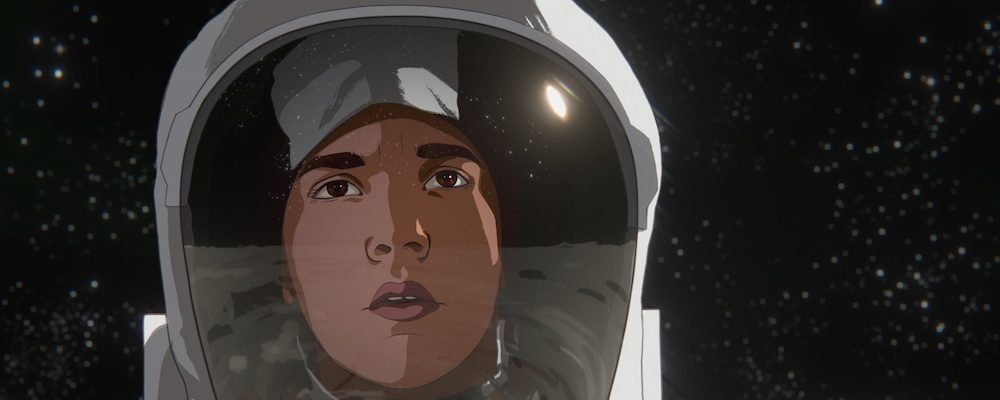Richard Linklater’s ‘Apollo 10½: A Space Age Childhood’ Is a Nostalgic Blast From the Past
Tony Sokol
Even NASA scientists forget to carry the 1 every now and then. In this way, director Richard Linklater’s animated adventure, “Apollo 10½: A Space Age Childhood,” is the polar opposite to the Best Picture-nominated “Hidden Figures,” where decimal points are characters the way cities can be on screen. Here, the numbers don’t quite add up. NASA accidentally made the Apollo 11 lunar module too small, and they’re looking for someone whose feet will reach the pedals. It’s the kind of scenario a 10½-year-old fourth grader might come up with.
Narrated by adult Stan (voiced by Jack Black), the film follows young Stan (voiced by Milo Coy), as he is recruited for a top secret mission of vital national importance based on his kickball skills, a few solid science reports, and three consecutive wins in the Presidential Physical Fitness Awards. He’s going to be the first person on the Moon.
The action, as well as archival news footage, home movies and old photos are rotoscoped, some of it appearing to be hand-drawn. This gives “Apollo 10½” both a retro and a timeless feel while playing out like a fading memory. Linklater is all about memory. The Apollo 11 launch was a huge, shared experience, televised in almost every living room around the world, and part of the collective subconscious. Towards the end of the film, Stan’s mother (voiced by Lee Eddy) says: It doesn’t matter if Stan saw the moonwalk or slept through it, “You know how memory is, someday he’ll think he saw it all.” Stan’s memory of his own pre-landing 1969 Moon mission could be the fantasy version of what happened while sleeping through it.
The film lets him live out the dream of being an astronaut. Just as young Stan is enjoying his first projectile-induced vomit, the space training sequence is broken by a flashback which perfectly sets up what Linklater had on the launching pad all along: Living in Dallas, near NASA, in the late ‘60s, “was like being where science fiction was coming to life.”
The bulk of the film explores Stan’s starry-eyed 1960s experience. The tone is positively giddy. Breathlessly recounting President Kennedy’s announcement of the moon mission, the astronauts, the Astrodome, Astro-Turf, and the New York Jets most propulsive machine, quarterback Joe Namath. Stan rushes home every day from school to watch “Dark Shadows,” discovers Herb Alpert and the Tijuana Brass, and absorbs every science fiction B-movie classic shown at the local theater with equal intensity. The soundtrack, like in all Linklater’s films, is as emotionally and narratively propulsive as the thousands of pounds of jet fuel used to fire a landing module into space.
Linklater’s “Waking Life,” from 2001, blurs live-action with rotoscoping to give the action a surreal look. “Apollo 10½” uses the process for almost excessive reality without losing its sense of wonder. The optimistic promise of a sci-fi future brushes against pollution and overpopulation fears, the Vietnam War, the “duck and cover” Cold War, and a string of televised political assassinations which Stan believes is just part of the adult world. He still gets to sleep in the car during the drives home, and chases after exterminator trucks as they blow toxic chemical insecticide over the green suburban lawns crawling with mosquitoes.
Glen Powell and Zachary Levi voice the NASA officials who have to break the news to Stan of the honor he can never speak about, to anyone. Older Stan admits his young self was a “fabulist,” a polite term “persistent liar.” It can also be known as a filmmaker. Apollo 10½ isn’t a true story of a moon landing, it is an allegory for growing up in the 1960s. Every step of getting the first man to the moon is seen through the viewpoint of a kid whose father (voiced by Bill Wise) is a pencil pusher sitting on the sidelines of the greatest event in history. Linklater brings magic to childhood in spite of the children.
A Linklater film should feel personal. “Before Midnight,” “Boyhood” and “Dazed and Confused” only masquerade as nostalgic. In “Apollo 10½,” reminiscences about chasing friends away with endless discussions about the ending of “2001: A Space Odyssey” carry forward motion as well as autobiographical confessions. Listening to an older sister wax poetic on the true meaning of the Beatles’ “Lucy in the Sky With Diamonds” is not frozen in time. It is active in the present of that time, and alive to contemporary audiences regardless of the age of the reference.
Even though the scope of the film expands beyond the Earth’s atmosphere, “Apollo 10½” is exactly what we want from Linklater in miniature. It is a coming-of-age in the space age story, filled with nostalgia of a casually dangerous time, but universally relatable. It features a stand-in for the writer-director, living out a fantasy in a fantastic time which still fascinates him. Stan ends the film enthusiastically looking forward to a future which he keeps consistently present.
“Apollo 10 ½: A Space Age Childhood” begins streaming April 1 on Netflix.

